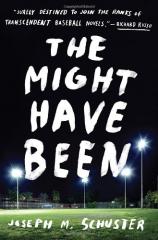The Might Have Been
Review
The Might Have Been
As I read THE MIGHT HAVE BEEN, Joseph M. Schuster’s melancholy début novel, I kept thinking about Antonio Salieri, as maligned a creative figure as history has ever given us. If we are to believe the portrait of the court composer depicted in Peter Shaffer’s Amadeus, Salieri was passionate about music, a capable craftsman, but nowhere near the genius that his contemporary Mozart was. Salieri had to labor over every note, whereas Mozart perfected some of music’s greatest compositions in his head. For Mozart, the process of putting notes on a staff was mere dictation. For Salieri, it was sweat and toil.
"The old-fashioned storytelling approach works well here and feels appropriate for a book about regret, compromised ambition, and loss."
The brilliant insight of Amadeus was that viewers would sympathize with Salieri rather than Mozart, as most of us aren’t geniuses. THE MIGHT HAVE BEEN is a novel about baseball’s Salieris and the sacrifices they’re willing to make. Like Shaffer’s play, it generates considerable compassion for its protagonist, in this case a baseball man who gives up a secure if boring life to pursue his dream of playing in the majors.
At the beginning of the novel, Edward Everett Yates has spent 10 years in the minors, most recently with the Cardinals’ triple-A team. It’s 1976. He’s called up to the parent club when a St. Louis player tears an ankle going into the stands after a pop fly. When Edward gets a start in the outfield in Montreal, he has a great game. He hits for the cycle in the first four-plus innings. But it’s pouring in Montreal, and with two out in the bottom of the fifth, an Expos player sends a deep fly to Edward. He leaps at the warning track, but one of his cleats catches on the chain-link fence behind him. Pain shoots through his knee. He falls to the dirt and blacks out. The game is rained out, Edward’s cycle doesn’t count, and his season is over.
The next year, the club gives Edward his unconditional release. He returns home to Iowa. A wealthy uncle gives him a job selling flour to restaurants and schools. Edward not only falls in love with Connie Heidrich, a high-school classmate with a nine-year-old son, he also makes more money as a flour salesman than he ever made as a ballplayer. He and Connie plan to marry. A life of comfortable domesticity lies before him.
But then he hears about local tryouts for the Cleveland Indians. He goes to the tryout and re-experiences the thrill of putting on a uniform, taking hacks in the batting cage, running out ground balls. When the novel jumps to 2009, we see that Edward gave up his girlfriend and her son and a promising career with his uncle’s firm and has spent 30 years managing minor-league teams. He has just split up with his most recent wife. And as he watches his latest crop of players struggle with their passions and limitations, 60-year-old Edward can’t help reflecting upon his own and wondering whether his sacrifices were worth the trouble.
The prose in this novel could have been tighter. We don’t need to know many of the details of Edward’s life or the backstories of the women he beds. Schuster introduces too many players and gives us too much play-by-play. Like a lot of novels or films about sports, THE MIGHT HAVE BEEN doesn’t avoid clichés. When Edward’s team enters its final weekend of play tied for first and ends the season with a three-game series against their co-division leaders, you just know that the teams will split the first two games and set up a winner-take-all finale.
But it’s to Schuster’s credit that the outcome of that final game doesn’t matter. What matters are the relationships among the players and the toll that long road trips and uncertain prospects take on the players’ families. Schuster does a nice job of showing us Edward’s pain when a talented ballplayer squanders natural gifts, and his anguish when dealing with a mediocre player who won’t accept the team’s decision to cut him. The old-fashioned storytelling approach works well here and feels appropriate for a book about regret, compromised ambition, and loss.
We’re two weeks away from Opening Day 2012. Some of the players who will take the field are Salieris who we’ll watch for a while and then probably never hear from again. The achievement of THE MIGHT HAVE BEEN is that we’ll look at those players, and perhaps even ourselves, with greater understanding and perspective than we might have otherwise.
Reviewed by Michael Magras on March 29, 2012
The Might Have Been
- Publication Date: March 20, 2012
- Genres: Fiction
- Hardcover: 352 pages
- Publisher: Ballantine Books
- ISBN-10: 0345530268
- ISBN-13: 9780345530264





